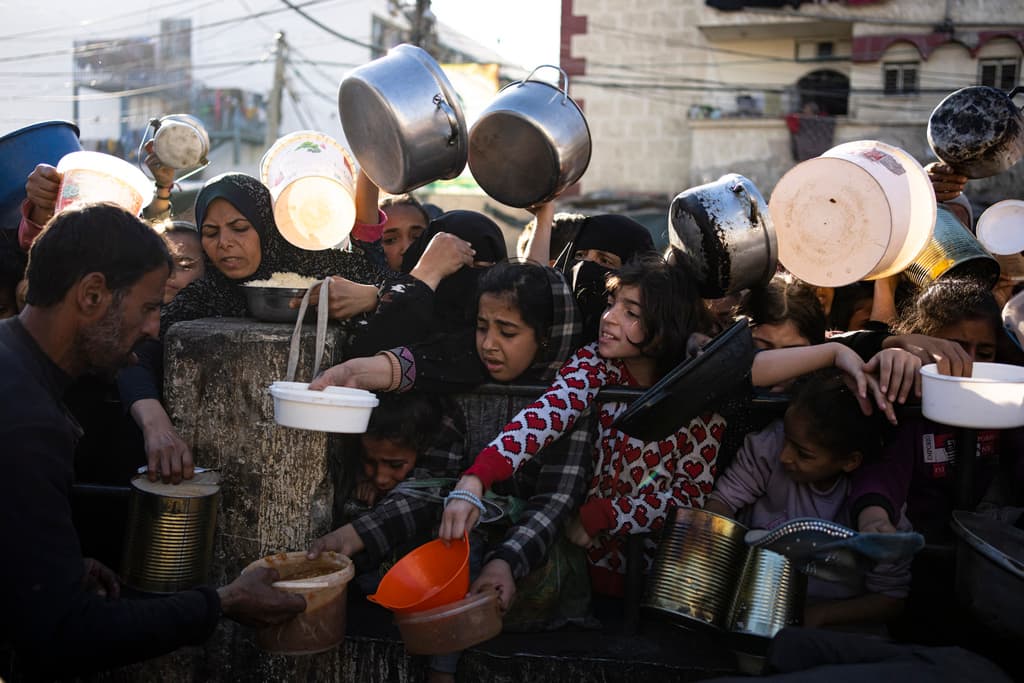While Biden Opposes Israel’s Plans for Rafah, His Pier Idea Could End Up Helping the Operation
As part of its war against Hamas, the Israel Defense Force plans to move more than a million Gazans who are sheltered at Rafah’s environs to encampments on the Strip’s southwestern shores. The proposed pier could serve as a lifeline to that area.

Announced during President Biden’s State of the Union address, the vision of a pier project off Gaza’s shores seems half-baked and may prove insufficient for easing humanitarian hardships. Yet, as a pilot program, it may augur more ambitious ideas for post-war Gaza.
For more than a decade, the Israeli foreign minister, Israel Katz, has promoted the idea of building an artificial island off of Gaza that would serve as a commercial port, and open the Strip to the world.
That idea is different from the president’s, though, Mr. Katz tells the Sun. “Biden is building an off-shore pier for delivering humanitarian aid. My idea is a permanent solution, and it has a good chance to be realized” should Israel prove victorious in its war against Hamas.
Mr. Katz’s vision involves an international port on an Israeli-built artificial island off Gaza’s shores. “Israel will control the waters around it, so there are no security threats, and Gaza, without Hamas, will gain access to the world,” he says.
The Israeli government is somewhat grudgingly supporting Mr. Biden’s idea for a temporary pier to receive aid sent in via Cyprus. “Israel must help international aid deliveries into Gaza,” Mr. Katz says. Under international pressure, “we need to do it so we can complete the war goals we have set.”
Those include eradicating Hamas, which according to Prime Minister Netanyahu will entail fighting at Rafah, where the terrorist organization’s leadership is holed up among four Hamas battalions.
While unintended, the American pier initiative could even help the Rafah operation, even as Mr. Biden opposes it. The Israel Defense Force’s plan is to move more than a million Gazans who are sheltered at Rafah’s environs to encampments on the Strip’s southwestern shores. The proposed pier could serve as a lifeline to that area.
Yet, the plan is fraught with problems. “In a day-after scenario, a lot of it makes sense, but in the day-before it makes much less sense,” the Foundation for Defense of Democracies’ Richard Goldberg tells the Sun.
Mr. Biden, for one, vowed “no boots on the ground,” but how close to shore would Americans need to get to ensure that aid goes where it is intended? According to the Pentagon’s plan, Navy support vessels and barges would pick up supplies from the pier via an 1,800-foot-long floating causeway. They would then transport it to land for distribution by “U.S. partners.” The Pentagon is yet to identify those.
While Mr. Biden’s plan may create a new access point for aid delivery, the distribution of aid inside the Strip has to date been much more complex than getting goods into Gaza. This week Israel has tepidly initiated a pilot program, handing over a small number of aid trucks to Gazan businessmen who have no known Hamas ties.
Meanwhile a ship operated by an American charity group, World Central Kitchen, set sail to Gaza on a 250-mile voyage from Cyprus Tuesday. Its cargo “does not exceed that of one or two trucks, and it will take days to arrive,” a Hamas spokesman, Salama Marouf, said. The terror group has been hostile to seaborne aid deliveries.
So, will Hamas, or one of its allies, like Hezbollah, launch rockets or drones at the American troops on the proposed pier? “That’s certainly a risk,” the Pentagon spokesman, Brigadier General Pat Ryder, told reporters this week, adding, “but if Hamas truly does care about the Palestinian people, then again, one would hope that this international mission to deliver aid to people who need it would be able to happen unhindered.”
For now, Hamas seems more interested in confiscating aid than in securing it for needy Gazans. Mr. Ryder uses “the same talking points the administration used for the Taliban,” Mr. Goldberg says, adding that his kind of logic hasn’t made sense in Afghanistan, and doesn’t now.
One advantage of the pier plan, though, may be related to Mideast politics. As the Middle East Media Research Institute’s founder, Yigal Carmon, writes in a new paper, much of Gaza aid is now managed by Hamas-allied Qatar. Egypt, which controls aid deliveries through Rafah, also benefits from bribes to its border officers.
Much of the planned sea-route aid, in contrast, is to come from the United Arab Emirates, which could “cut off the Hamas-Qatar control of supplies,” Mr. Carmon writes. He quotes several Qatari, Egyptian, and Iranian officials and their supporters who have denounced the American initiative.
The Navy’s 7th Transportation Brigade, which is expected to lead construction of the pier, has set sail from Virginia this week. It is due to reach the eastern Mediterranean in two months, by which time the entire Mideast map could be transformed. Perhaps, though, rather than Mr. Biden’s plan, America could then help the Israelis realize Mr. Katz’s vision.

